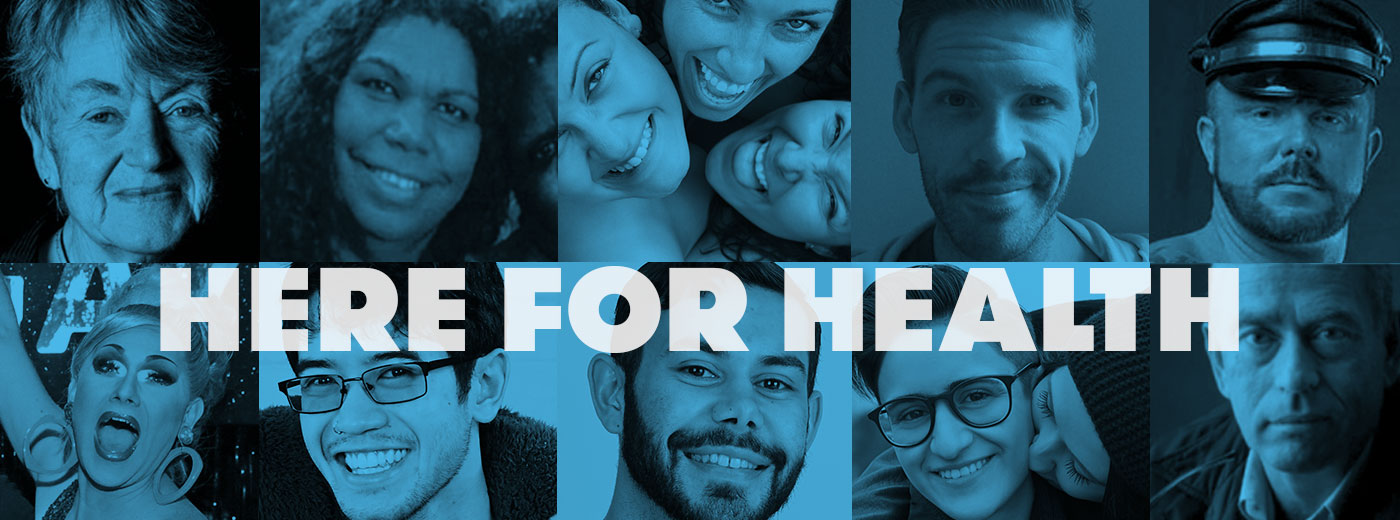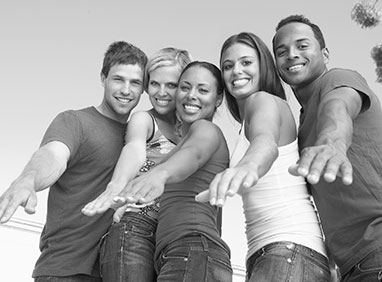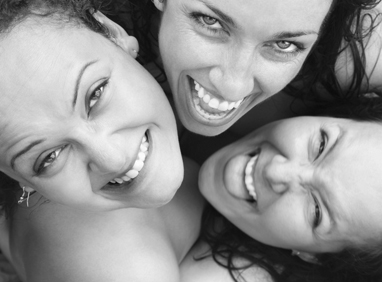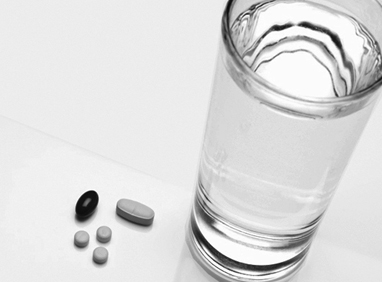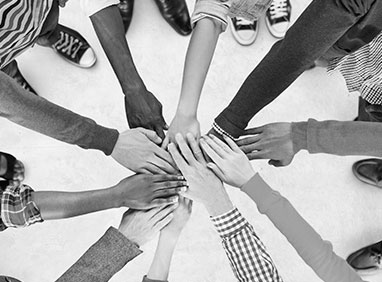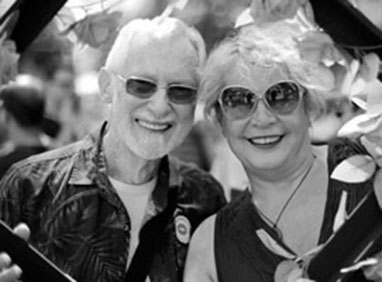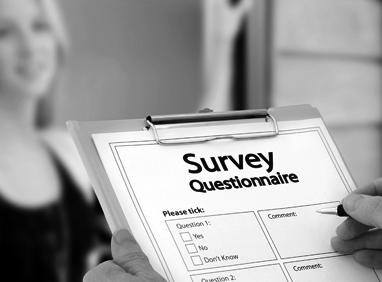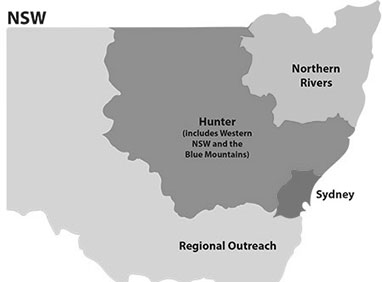We’re here to help end HIV transmission among gay and homosexually active men by helping them test often, treat early and stay safe.
We do this by promoting education campaigns, operating HIV and STI testing facilities, running gay health workshops, providing a range of support services and distributing hundreds of thousands of free condoms every year throughout NSW.
Quick Links
- Rapid HIV testing options in NSW: a[TEST] facilities, Medical or sexual health clinic in NSW
Information
HIV Basics
What Is HIV & AIDS?
HIV stands for Human Immunodeficiency Virus. The virus affects the body’s immune system, its main defence against disease. If untreated, HIV weakens a person’s immune system over time, leaving them open to other life-threatening infections.
AIDS stands for Acquired Immune Deficiency Syndrome which refers to the range of specific illnesses that a person with HIV may get when their immune system becomes weakened by HIV.
It is important to test for HIV often so that anyone who may unknowingly have HIV can start on effective treatments to stay healthy. It is recommended that anyone diagnosed with HIV goes on treatment immediately as this will reduce the level of HIV in the body, maintain a strong immune system and keep the person healthy. For those adhering to HIV treatments, this prevents the progression of HIV to AIDS.
How Is HIV Transmitted?
HIV is transmitted when bodily fluids carrying HIV (blood, semen, vaginal fluids, breast milk or anal mucus) pass from a person with HIV into the bloodstream of a person who does not have HIV.
HIV can be transmitted in several ways, but for gay, bi and other men who have sex with men, most infections occur during anal sex without the protection of condoms, PrEP or an undetectable viral load (UVL). Other forms of transmission include vaginal/front hole sex without condoms and sharing injecting equipment.
For people who do not have HIV, they can prevent acquiring HIV by being responsible for their health using condoms, PrEP or PEP. HIV positive people on treatment with a UVL will not transmit HIV to their partners.
How Does HIV Affect Health?
When left untreated, HIV causes damage to the immune system over time although the precise impact can vary from person to person. Among other things, a damaged immune system can impact on a person’s ability to fight off infections and illnesses. When someone contracts HIV they may experience something called a ‘seroconversion illness’ which is associated with flu like symptoms. Not everyone will get this illness.
Adhering to HIV treatment will reduce the risk of developing adverse health conditions associated with HIV. The Start Study found that commencing treatment immediately after infection makes a significant difference to a person’s health outcomes. Many people with HIV consider the condition a manageable illness. With appropriate care, treatment and support, the impact of HIV on a person’s health and life expectancy can be greatly reduced.
Find out more about HIV prevention, testing and treatment on our Ending HIV website
HIV Prevention Basics
There are a range of ways to prevent HIV. Sometimes the use of various strategies to prevent HIV is referred to as ‘combination prevention’. Combination prevention includes the use of condoms, PrEP, PEP, having an Undetectable Viral Load (UVL) or Treatment as Prevention (TasP) otherswise known as Undetectable = Untransmittable (U=U).
Pre-Exposure Prophylaxis (PrEP)
Pre-Exposure Prophylaxis (PrEP) is the use of HIV medication to keep HIV negative people from contracting HIV.
When PrEP was first introduced, taking it daily was the recommendation for everyone. Since then, research supports the safety of taking PrEP in other ways that are just as effective as daily dosing.
Today, PrEP can be taken daily, on-demand or periodically.
Read more about the different ways to take PrEP on our Ending HIV website.
PrEP is highly effective at preventing HIV but PrEP does not prevent the transmission of other sexually transmitted infections (STIs). For this reason, it is recommended that people who are taking PrEP to test for STIs every three months.
People who are using PrEP should consider maintaining their condom use, particularly for casual partners.
PrEP is now available on the PBS, making it affordable and accessible across Australia.
Find out more about how to access PrEP on our Ending HIV website.
Condoms & Lube
Condoms prevent or reduce the exchange of semen, vaginal fluid, or blood between partners during sex. When used with lube, condoms are a highly effective way to ‘stay safe’ and prevent HIV transmission.
Condoms also offer protection against a range of other sexually transmissible infections (STIs). They do this by preventing the transfer of bodily fluids or by covering affected genital areas.
Find out more about using condoms and staying safe on our Ending HIV website.
Undetectable Viral Load (UVL) & U = U
When a person living with HIV is on effective treatment, they often achieve what is called an undetectable viral load (UVL). This means that HIV is no longer able to be detected in their body by viral load tests, meaning the amount of virus is extremely low. Many people refer to this as being “undetectable”.
U=U, which stands for ‘undetectable equals untransmittable’, emphasizes the science behind undetectable, declaring it a safe and effective way of preventing transmission. On dating apps, some guys have started to use the term in their profiles to help communicate their undetectable status.
There has never been a case of a person with an undetectable viral load passing on HIV to a sexual partner, a fact backed up by major international studies. For this reason, using treatment to prevent HIV (TasP) is considered effective and safe.
Find out more about UVL, U = U and TasP on our Ending HIV website.
HIV Prevention Basics
There are a range of ways to prevent acquiring HIV, referred to as combination prevention. This includes the use of condoms, PrEP and/or choosing partners with an undetectable viral load (UVL).
Pre-Exposure Prophylaxis (PrEP)
Pre-Exposure Prophylaxis (PrEP) is the use of HIV medication to keep HIV negative people from contracting HIV. In Australia it is recommended that PrEP is taking as one pill, once a day.
PrEP is highly effective at preventing HIV when taken as prescribed. Although PrEP does not prevent the transmission of other STIs, which can, in turn, increase the possibility of HIV infection. This is why we encourage people who are taking PrEP to regularly check in with their sexual health provider. If any STIs do occur, get them treated and follow the advice of your sexual health provider.
People who are using PrEP should consider maintaining their condom use, particularly for casual partners, until you are aware of their testing regimen.
PrEP is now available on the PBS, making it affordable and accessible across Australia. Find out more information on how you can access PrEP now here.
Condoms & Lube
Condoms prevent or reduce the exchange of semen, vaginal fluid or blood between partners during sex. When used with lube, condoms are a highly effective way to ‘stay safe’ and prevent HIV transmission.
Condoms also offer protection against a range of other sexually transmissible infections (STIs). They do this by preventing the transfer of bodily fluids or by covering affected genital areas.
Find out more about using condoms and staying safe
Undetectable Viral Load (UVL) & Treatment as Prevention (TasP)
When a person living with HIV is on effective treatment, they often achieve what is called an “undetectable viral load”. This means that HIV is no longer able to be detected in their bodies by viral load tests, meaning the amount of virus is their bodies is extremely low. Many people refer to this as being “undetectable”.
In term of HIV prevention, there has never been a case of a person with an undetectable viral load passing on HIV to a sexual partner, a fact backed up by major international studies.
“Treatment as Prevention” (TasP) is when you choose sexual partners who are undetectable as there is not considered to be a risk of acquiring HIV from someone who has been had an UVL for more than six months.
Risk Reduction Strategies
In addition to the use of condoms and lube, there are a range of other strategies that reduce, but don’t eliminate, the risk of HIV transmission.
These strategies include: ensuring HIV-negative partners are insertive (i.e. the ‘top’); ensuring partners have the same HIV status (i.e. pos-pos or neg-neg); and ensuring HIV-positive partners have an undetectable viral load. All these strategies carry risks that vary according to practice and circumstance.
Our Ending HIV Initiative
Help Us End HIV Transmission In NSW By 2020
Our Ending HIV initiative aims to educate gay men – the population group in NSW most at risk from HIV – about the real possibility that HIV transmission in NSW could be virtually eliminated by 2020 as a result of advances in testing technologies and HIV treatments.
The campaign seeks to educate gay men about three key activities they need to undertake to help end the epidemic:
1) Test Often – sexually active gay men need to get tested for HIV at least twice a year, as this is the only way that undiagnosed infections can be decreased and access to treatment can be increased
2) Treat Early – advances in HIV medicines offer improved health benefits for people with HIV and can reduce traces of the virus in their body to an undetectable level, significantly reducing the likelihood of them transmitting HIV
3) Stay Safe – condoms and other risk reduction strategies remain central to the fight against HIV so gay men need to maintain a culture of safe sex
Launched in 2013, the campaign forms a key part of the NSW HIV Strategy 2012-2015, a plan to reduce HIV transmission among gay men in NSW by 80% over the next 10 years.
Test Often
Knowing your HIV status is vital to our efforts to end HIV transmission in NSW.
For gay, bi and other men who have sex with men, it’s recommended to get tested for HIV and STIs every three months while sexually active. People who are not sexually active or in a monogamous relationship may test less frequently but at least annually.
Benefits of Testing
Many new HIV transmissions in NSW occur when someone thinks they’re negative when they are actually positive. That’s because it can take years before HIV symptoms are noticeable.
Testing regularly so you know your HIV status allows you to protect your health and the health of your sexual partners.
If you find out you have HIV, you can start on HIV treatment to protect your health. There are plenty of services available to assist you with a new HIV diagnosis, including many provided by ACON.
Getting Tested
Now that rapid HIV testing is available in NSW, testing for HIV is easier than ever, with results available in around 30 minutes.
You can get tested for HIV at any of ACON’s services or any
There are other testing technologies that are approved for use in Australia, such as home-based testing kits.
a[TEST]
ACON testing services include a[TEST] Surry Hills, a[TEST] Oxford St, and a[TEST] Chinese Clinic. Bookings are required and a face mask is required for entry.
a[TEST] Oxford Street
Located at 167 Oxford Street Surry Hills and open from Monday to Friday from 11am-6.15pm and Saturdays from 11:30am to 2:30pm.
a[TEST] Surry Hills
Located at 414 Elizabeth Street Surry Hills and open on Wednesdays from 2pm to 6.45pm.
a[TEST] Chinese Clinic
Our a[TEST] clinic operated with a peer and nurse who can speak Mandarin, this service welcomes both Mandarin speaking and non-Mandarin speaking clients.
Located at 414 Elizabeth Street Surry Hills and open on Thursdays from 2pm to 6.45pm.
For more information or to make an appointment with any of our a[TEST] services visit the Ending HIV website here.
Treat Early
By getting on treatment, people with HIV can look after themselves and their partners and help end HIV transmission.
Benefits of Treatment
For people living with HIV, treatment keeps the immune system healthy and reduces the risk of developing health conditions associated with HIV.
Research shows that when a person living with HIV is on effective treatment and has had a sustained undetectable viral load (UVL) for six months, it is not possible for them to transmit the virus to a sexual partner.
Who’s On Treatment?
Over 95% of people living with diagnosed HIV in NSW are on treatment. We need to maintain this number if we’re going to reach our goal of ending HIV transmission.
Why Early Treatment?
You may not know you’ve contracted HIV, but in the early stages of a new HIV infection the amount of HIV virus in your body (viral load) is very high. Having a high viral load greatly increases the risk of HIV transmission. This is why HIV is more likely to be transmitted by people who don’t know they’ve got HIV and during the early stages of their infection.
That’s why it’s so important to test regularly and get onto treatment early. If you know your HIV status, you can make informed choices about your health, including HIV treatment and sexual health.
Find Out More
For more information about HIV treatment, please visit our Ending HIV website.
Stay Safe
There are a range of ways to prevent HIV. Sometimes the use of various strategies to prevent HIV is referred to as ‘combination prevention’. Combination prevention includes the use of condoms, PrEP, Undetectable Viral Load (UVL) also known as U = U and PEP (Post-Exposure Prophylaxis).
Pre-Exposure Prophylaxis (PrEP)
Pre-Exposure Prophylaxis (PrEP) is the use of HIV medication to keep HIV negative people from contracting HIV.
When PrEP was first introduced, taking it daily was the recommendation for everyone. Since then, research has found there to be new ways for taking PrEP that are just as effective as daily dosing.
Today, PrEP can be taken daily, on-demand or periodically.
Read more about the different ways to take PrEP on our Ending HIV website.
PrEP is highly effective at preventing HIV but PrEP does not prevent the transmission of other sexually transmitted infections (STIs). For this reason, we encourage people who are taking PrEP to test for STIs every three months.
People who are using PrEP should consider maintaining their condom use, particularly for casual partners.
PrEP is now available on the PBS, making it affordable and accessible across Australia.
Find out more about how to access PrEP on our Ending HIV website.
Condoms & Lube
Condoms prevent or reduce the exchange of semen, vaginal fluid, or blood between partners during sex. When used with lube, condoms are a highly effective way to ‘stay safe’ and prevent HIV transmission.
Condoms also offer protection against a range of other sexually transmissible infections (STIs). They do this by preventing the transfer of bodily fluids or by covering affected genital areas.
Find out more about using condoms and staying safe on our Ending HIV website.
Undetectable Viral Load (UVL) & U = U
When a person living with HIV is on effective treatment, they often achieve what is called an “undetectable viral load”. This means that HIV is no longer able to be detected in their body by viral load tests, meaning the amount of virus is extremely low. Many people refer to this as being “undetectable”.
There has never been a case of a person with an undetectable viral load passing on HIV to a sexual partner, a fact backed up by major international studies.
HIV Self Testing
HIV self-testing (HST) devices allow for discretion in the HIV testing process for those who may feel more comfortable testing in this way or who may not be able to physically attend a testing service.
While there is an option to buy HST devices from overseas, we encourage people to purchase TGA-approved HST devices, as quality assurance is provided as well as local contact information for support and follow-up.
As these devices are screening tests, the possible results are ‘reactive’, ‘negative’ (non-reactive), or ‘invalid’. Any reactive result needs to be confirmed by a diagnostic test conducted by a healthcare professional.
HIV self-tests work by detecting HIV antibodies, which the immune system produces anywhere between 2 weeks to 3 months after exposure to the virus. Because of this window period, HIV self-test devices may not provide a conclusive result until up to 3 months after a risk of exposure.
If you are considering self-testing for HIV, it’s important to make sure you know who to contact so you can be linked into care, support and diagnostic testing services. For this reason, we also suggest that people not test alone and test at times when relevant support services are operating.
HIV self-testing in Australia
The first HIV self-test is now approved for sale in Australia. An HIV self-test is a finger-prick blood test that you can perform on yourself, at home or elsewhere, and receive results in 15 minutes. The testing kit comes as an easy-to-use device with directions.
Australia only has one test approved for sale. It is recommended to only purchase tests approved for sale as you can be assured the test is reliable and safe.
You can connect direct to the website selling the approved HIV self-test in Australia here.
For more detailed information on approved HIV self-testing in Australia, visit the Health Equity Matters website.
Using a HIV Self-Testing Device from Overseas
Some people choose to import other HIV self-tests from overseas. It is important to understand that these tests present more of risk in terms of safety and accuracy than HIV self-tests approved for sale in Australia. It’s unlikely that HIV self-testing devices purchased from overseas will have Australian-specific information on what to do with your results.
As of July 2016, the World Health Organisation reports that 16 countries have HIV self-testing policies. It is important to research a device to ensure that it has been approved by a reputable regulator.
USAID (the United States Agency for International Development) maintains a list of rapid HIV testing devices approved for use in their programs (usaid.gov). Devices vary in terms of their quality and accuracy. They may also suffer from exposure to heat during international shipping which could affect the performance of the test.
Need To Talk?
If you want to talk to someone about a positive or reactive result, call:
- ACON: (02) 9206 2000
Free Call: 1800 063 060 | TTY: (02) 9283 2088
We provide an HIV Diagnosis Priority Service between Monday and Friday.
When you call, tell us that you’re newly diagnosed or testing for HIV and would like to speak with one of our counsellors or health promotion officers.
You’ll get a call back within one working day of your initial call. - NSW Sexual Health Infoline: 1800 451 624 | TTY 02 9221 6515
- QLife: 1800 184 527
- If you want to talk to someone outside of business hours (9am – 6pm), then please call Lifeline’s 24-hour crisis counselling service: 13 11 14
- If you’ve had a recent risk event, you can take PEP to prevent infection, but only if it’s taken with 72 hours of exposure to HIV. Call the PEP Hotline on: 1800 737 669.
OTHER TESTING OPTIONS
Gay, bi and queer men (cis and trans) have several HIV testing options:
Free rapid HIV tests are provided at a[TEST] as part of a comprehensive HIV and sexual health testing at sites on Oxford St and in Surry Hills. Book a test at our a[TEST] service here.
Standard laboratory testing is available through most GPs and at all sexual health services. Find out where you can get tested on our Ending HIV website.
Dried Blood Spot Testing
To help increase testing rates, NSW Health has introduced Dried Blood Spot (DBS) testing to provide a greater variety of testing options for HIV.
The Dried Blood Spot HIV test is, free, easy, private, and accurate way to test for HIV. It involves a few drops of blood that you collect from yourself at home via a small pin prick. You return the DBS HIV test in a reply-paid envelope and receive the result by phone, text or email. You don’t need to go to a clinic or a doctor to do this test.
DBS HIV testing is for people living in NSW who are over 16 years old.
The test is for gay and other men who have sex with men, people from Africa or Asia and people who have current or previous sexual partners from Africa or Asia, Aboriginal and Torres Strait Islander people and people who inject drugs.
You can register for a DBS HIV test on the DBS website.
Gay Friendly GPs
When it comes to sexual health, lots of gay men like to speak with a supportive doctor who understands the ins and outs of gay sex.
Download a full list of Gay Friendly GPs here (Updated: May 2018)
Services
HIV Testing
Knowing your HIV status is vital to our efforts to end HIV transmission in NSW.
For gay, bi and other men who have sex with men, it’s recommended to get tested for HIV and STIs every three months while sexually active. People who are not sexually active or in a monogamous relationship may test less frequently, but at least annually.
Benefits of Testing
Many new HIV transmissions in NSW occur because someone may think they’re negative when they are actually positive. That’s because it can take years before HIV symptoms are noticeable.
Testing regularly so you know your HIV status allows you to protect your health and the health of your sexual partners.
If you find out you have HIV, you can start on HIV treatment to maintain your health. There are plenty of services available to assist you with a new HIV diagnosis, including many provided by ACON.
Getting Tested
Now that rapid HIV testing is available in NSW, testing for HIV is easier than ever, with results available in around 30 minutes.
You can get tested for HIV at any of ACON’s services or any
There are other testing technologies that are approved for use in Australia, such as home-based testing kits.
a[TEST]
ACON testing services include a[TEST] Surry Hills, a[TEST] Oxford St, and a[TEST] Chinese Clinic. Bookings are required and a face mask is required for entry.
a[TEST] Oxford Street
Located at 167 Oxford Street Surry Hills and open from Monday to Friday from 11am-6.15pm and Saturdays from 11:30am to 2:30pm.
a[TEST] Surry Hills
Located at 414 Elizabeth Street Surry Hills and open on Wednesdays from 2pm to 6.45pm.
a[TEST] Chinese Clinic
Our a[TEST] clinic operated with a peer and nurse who can speak Mandarin, this service welcomes both Mandarin speaking and non-Mandarin speaking clients.
Located at 414 Elizabeth Street Surry Hills and open on Thursdays from 2pm to 6.45pm.
For more information or to make an appointment with any of our a[TEST] services visit the Ending HIV website here.
Workshops for gay, bi+, queer men (trans and cis) 18+.
ACON offers a range of FREE workshops for same-sex attracted guys ages 18+ (trans and cis).
Our workshops are designed by the community and are run by Peer Educations’ Volunteer Facilitators who are also gay, bi+ and queer!
Each of our workshops is different and aims to explore a topic that matters to our community. Some of the topics our workshops cover:
- How to navigate sexuality and identity.
- How to have safe, consensual, and enjoyable sex.
- How to develop and maintain healthy relationships.
- How to use dating apps and navigate hook up culture.
Each of our workshops also provides participants with the latest sexual health and STI information available in a fun and sex-positive way.
Each group runs with 10-16 people and runs over four weeks.
Register for our current workshops below.
Workshops for gay, bi+, queer men aged 18-26 (SPARK)
Our Young gay, bi+, queer Men’s Project, SPARK, offers a range of FREE workshops for young gay, bi+, queer guys (trans and cis) aged 18-26 years old.
Participating in a workshop is a great way to make new friends in a safe social environment and learn more about identity, coming out, sex and sexual health, HIV, relationships, the LGBTI community and other relevant topics.
There are usually between 10 and 14 guys in each group. Our workshops are facilitated by trained community volunteers and run over four sessions. Workshops happen at ACON’s offices in central Sydney and some regional offices.
Please contact youth@acon.org.au for more information.
Free Condoms
Slip It On!
Condoms prevent or reduce the exchange of semen, vaginal fluid or blood between partners during sex. When used with lube, condoms are a highly effective way to ‘stay safe’ and prevent HIV transmission.
Condoms also offer protection against a range of other sexually transmissible infections (STIs). They do this by preventing the transfer of bodily fluids or by covering affected genital areas.
To help prevent the transmission of HIV and other STIs, ACON distributes over 230,000 condoms and safe sex packs every year to a range of community venues, clinics and events.
To find out where you can get free condoms and safe sex packs, visit our Ending HIV website.
To get free condoms at your community venue, event, or clinic, contact your nearest ACON office.
ACON Sexperts
SEXPERTS is a long running volunteer project. ACON’s SEXPERTS operate in some of our most popular sex on premisses venues (SOPVs) where they support our communities through conversation-based peer education.
SEXPERTS can answer questions about PrEP, PEP, undetectable viral load (UVL), HIV and STI testing, MPOX vaccination, sexualised drug use, cruising etiquette and general sex education.
We have a committed and fun group of volunteers. We are looking to recruit more volunteers as we expand this project to new premises.
To express interest in becoming a SEXPERT contact us on (02) 9206 2074 or email us, SDUProject@acon.org.au.
